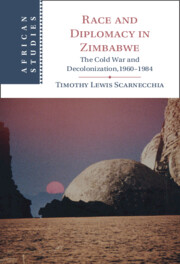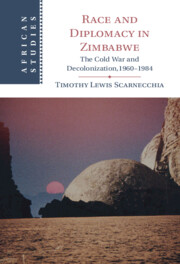Refine search
Actions for selected content:
16 results
4 - “We Don’t Give a Damn about Rhodesia”
-
- Book:
- Race and Diplomacy in Zimbabwe
- Published online:
- 02 March 2023
- Print publication:
- 09 March 2023, pp 96-130
-
- Chapter
-
- You have access
- Open access
- HTML
- Export citation
8 - The 1980 Elections and the First Years of Independence
-
- Book:
- Race and Diplomacy in Zimbabwe
- Published online:
- 02 March 2023
- Print publication:
- 09 March 2023, pp 227-265
-
- Chapter
-
- You have access
- Open access
- HTML
- Export citation
5 - Negotiating Independence
-
- Book:
- Race and Diplomacy in Zimbabwe
- Published online:
- 02 March 2023
- Print publication:
- 09 March 2023, pp 131-164
-
- Chapter
-
- You have access
- Open access
- HTML
- Export citation
7 - The Big Gamble
-
- Book:
- Race and Diplomacy in Zimbabwe
- Published online:
- 02 March 2023
- Print publication:
- 09 March 2023, pp 203-226
-
- Chapter
-
- You have access
- Open access
- HTML
- Export citation
9 - Gukurahundi and Zimbabwe’s Place in the 1980s Cold War
-
- Book:
- Race and Diplomacy in Zimbabwe
- Published online:
- 02 March 2023
- Print publication:
- 09 March 2023, pp 266-314
-
- Chapter
-
- You have access
- Open access
- HTML
- Export citation
3 - Liberation Struggles in Southern Africa
-
- Book:
- Race and Diplomacy in Zimbabwe
- Published online:
- 02 March 2023
- Print publication:
- 09 March 2023, pp 64-95
-
- Chapter
-
- You have access
- Open access
- HTML
- Export citation
6 - Negotiating Independently
-
- Book:
- Race and Diplomacy in Zimbabwe
- Published online:
- 02 March 2023
- Print publication:
- 09 March 2023, pp 165-202
-
- Chapter
-
- You have access
- Open access
- HTML
- Export citation

Race and Diplomacy in Zimbabwe
- The Cold War and Decolonization,1960–1984
-
- Published online:
- 02 March 2023
- Print publication:
- 09 March 2023
-
- Book
-
- You have access
- Open access
- Export citation
4 - “We Don’t Give a Damn about Rhodesia”
-
- Book:
- Race and Diplomacy in Zimbabwe
- Published online:
- 14 September 2021
- Print publication:
- 23 September 2021, pp 96-130
-
- Chapter
- Export citation
8 - The 1980 Elections and the First Years of Independence
-
- Book:
- Race and Diplomacy in Zimbabwe
- Published online:
- 14 September 2021
- Print publication:
- 23 September 2021, pp 227-265
-
- Chapter
- Export citation
9 - Gukurahundi and Zimbabwe’s Place in the 1980s Cold War
-
- Book:
- Race and Diplomacy in Zimbabwe
- Published online:
- 14 September 2021
- Print publication:
- 23 September 2021, pp 266-314
-
- Chapter
- Export citation
6 - Negotiating Independently
-
- Book:
- Race and Diplomacy in Zimbabwe
- Published online:
- 14 September 2021
- Print publication:
- 23 September 2021, pp 165-202
-
- Chapter
- Export citation
5 - Negotiating Independence
-
- Book:
- Race and Diplomacy in Zimbabwe
- Published online:
- 14 September 2021
- Print publication:
- 23 September 2021, pp 131-164
-
- Chapter
- Export citation
3 - Liberation Struggles in Southern Africa
-
- Book:
- Race and Diplomacy in Zimbabwe
- Published online:
- 14 September 2021
- Print publication:
- 23 September 2021, pp 64-95
-
- Chapter
- Export citation
7 - The Big Gamble
-
- Book:
- Race and Diplomacy in Zimbabwe
- Published online:
- 14 September 2021
- Print publication:
- 23 September 2021, pp 203-226
-
- Chapter
- Export citation

Race and Diplomacy in Zimbabwe
- The Cold War and Decolonization,1960–1984
-
- Published online:
- 14 September 2021
- Print publication:
- 23 September 2021
-
- Book
- Export citation
